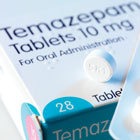GPs will need to observe tighter restrictions on the prescribing of tramadol and temazepam under Government plans to try to cut down on misuse of the drugs.
The changes will mean GPs will have to start providing written prescriptions for both tramadol and temazepam and will only be able to prescribe a month’s supply of the drugs at a time.
The restriction of tramadol prescribing comes after the Home Office accepted advice the drug should become controlled as a class C drug and placed in schedule 3 of the 2001 regulations on drugs misuse, following a spate of deaths linked to ‘recreational’ use.
The Government also plans to lift current exemptions on prescribing of the controlled drug temazepam, to bring it line with other schedule 3 drugs, because of ‘ongoing concerns’ around its misuse.
Following consultation on the proposals, however, the Home Office has accepted concerns from stakeholders including the Royal Pharmaceutical Society that ‘safe custody’ requirements for schedule 3 drugs would present problems for community and hospital pharmacies handling large volumes of tramadol prescriptions.
Related stories
Paracetamol appropriate pain relief for osteoarthritis, say international experts
Dr Bill Beeby, deputy chair of the GPC’s clinical and prescribing subcommittee questioned how much impact the changes would have on tramadol over-dosing but said GPs would ‘accept the changes and work around them’.
Dr Beeby said: ‘There shouldn’t be any concern with normal prescribing – and I don’t know that controlled drug regulations greatly help with deaths from recreational use, but perhaps it does change the way it is supplied and people’s appreciation of these risks.’
Dr Beeby said GPs should be able to prescribe alternatives to temazepam.
He said: ‘There are other drugs that are perhaps less problematic, but all of these drugs should be considered carefully. The regulations and rules are there for a purpose – to draw attention to the fact this is a controlled drug to prescribers, and if the workload is onerous then consider using alternatives.’
Dr Richard West, chair of the Dispensing Doctors’ Association, questioned the rationale for the changes, which he said could mean a big increase in workload given controlled drugs cannot yet be prescribed electronically.
Dr West said: ‘We have concerns the proposals represent expensive over-regulation – we’re not sure the changes they propose will solve the perceived problem.’
He added: ‘The electronic prescription service doesn’t allow prescription of controlled drugs as it is currently set up, which will mean considerable work for practices because you have some prescriptions that can go one way and others that can’t – and the patients will not understand that change.’
‘It will cause increased confusion and extra workload and therefore extra cost, but without clear evidence of what benefit there is.’
Outlining its decision, the Home Office stated: ‘The Government has taken on board the concerns raised in the consultation and has therefore decided to pursue [an alternative option] whereby tramadol is placed in Schedule 3 to the Regulations but with exemption from the safe custody requirements.’
On temazepam, the Home Office concluded: ‘The Government has considered the responses in the light of ongoing concerns around the misuse of temazepam, the fact that the vast majority of temazepam prescriptions are computer generated, evidence that prescribing of temazepam is currently at very low levels, and also in light of efforts to introduce electronic prescribing for Schedules 2 and 3 controlled drugs in the near future.’
‘The Government assesses that on the available evidence, the existing exemption for temazepam prescriptions are no longer warranted and should therefore be removed.’
Pulse October survey
Take our July 2025 survey to potentially win £1.000 worth of tokens













